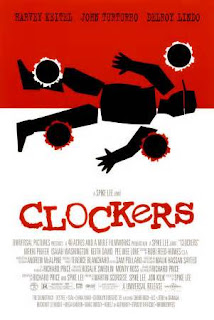Clockers
Getting back to the films of Spike Lee...
In 1995 Lee made Clockers, and what was notable is that it was the first time Lee adapted someone else's book. Originally Martin Scorsese was to make the film based on Richard Price's novel, but he gave it to Lee, who wrote the script with Price. It's a gritty, above-average crime drama, that Lee puts on a stamp on by highlighting the anguish of young black men's lives lost to drugs and crime.
Mekhi Pfifer stars as Strike, a young man who is a "clocker," that is, a low-level drug peddler who works for Delroy Lindo, the local drug lord (Lee moved the action from New Jersey in Price's book to Brooklyn). Lindo is something like a Fagin figure, who recruits kids when they are teens and work their way up his organization. When another dealer steals from Lindo, he wants Pfifer to kill him.
Pfifer has a straight-arrow brother (Isaiah Washington). who takes the rap for the crime. Investigating detective Harvey Keitel smells a rat, and tries to pin the crime on Pfifer, because he's convinced Washington didn't do it. His partner, John Turturro, wants to leave things alone.
Clockers is part police procedural, part sociological study. We see the lives of those in the Brooklyn projects, especially how the young are seduced by the lifestyle. A mother and a local cop (Keith David) try to keep kids on the straight and narrow, and keep them away from the likes of Pfifer. But it's tough, as the money is too good.
There's also a tension in the lives of the police. When they arrive at the scene of a murder, if the victim is a young black man there is a lot of coarse, insensitive commentary. This either shows racism or a numbness to it all or both. Keitel and Turturro use insulting language about blacks even in front of other black policemen.
Clockers is a good film, but it didn't make much impact. I think, given how things haven't changed much in the relations between black men and police, that it still has a lot to say. The photography is a style that was used on exploitation films of the seventies, with lurid, blurred colors. The performances are all fine.
Now that I'm a teacher I'm even more aware of how fragile the lives of minorities are. To see a young black child and feel in your heart that they are going to have to struggle to stay the proper course gives me a lump in my throat. Each black teenager that dies is a story of the failure of someone--the system, the parents, the community, and the choices made by the teenager himself. But all of these lives had promise. Pointedly, Pfifer has an interest in trains, with an extensive model railroad. At the end of the film he's on a train, headed west, the historical place of new chances.
In 1995 Lee made Clockers, and what was notable is that it was the first time Lee adapted someone else's book. Originally Martin Scorsese was to make the film based on Richard Price's novel, but he gave it to Lee, who wrote the script with Price. It's a gritty, above-average crime drama, that Lee puts on a stamp on by highlighting the anguish of young black men's lives lost to drugs and crime.
Mekhi Pfifer stars as Strike, a young man who is a "clocker," that is, a low-level drug peddler who works for Delroy Lindo, the local drug lord (Lee moved the action from New Jersey in Price's book to Brooklyn). Lindo is something like a Fagin figure, who recruits kids when they are teens and work their way up his organization. When another dealer steals from Lindo, he wants Pfifer to kill him.
Pfifer has a straight-arrow brother (Isaiah Washington). who takes the rap for the crime. Investigating detective Harvey Keitel smells a rat, and tries to pin the crime on Pfifer, because he's convinced Washington didn't do it. His partner, John Turturro, wants to leave things alone.
Clockers is part police procedural, part sociological study. We see the lives of those in the Brooklyn projects, especially how the young are seduced by the lifestyle. A mother and a local cop (Keith David) try to keep kids on the straight and narrow, and keep them away from the likes of Pfifer. But it's tough, as the money is too good.
There's also a tension in the lives of the police. When they arrive at the scene of a murder, if the victim is a young black man there is a lot of coarse, insensitive commentary. This either shows racism or a numbness to it all or both. Keitel and Turturro use insulting language about blacks even in front of other black policemen.
Clockers is a good film, but it didn't make much impact. I think, given how things haven't changed much in the relations between black men and police, that it still has a lot to say. The photography is a style that was used on exploitation films of the seventies, with lurid, blurred colors. The performances are all fine.
Now that I'm a teacher I'm even more aware of how fragile the lives of minorities are. To see a young black child and feel in your heart that they are going to have to struggle to stay the proper course gives me a lump in my throat. Each black teenager that dies is a story of the failure of someone--the system, the parents, the community, and the choices made by the teenager himself. But all of these lives had promise. Pointedly, Pfifer has an interest in trains, with an extensive model railroad. At the end of the film he's on a train, headed west, the historical place of new chances.



Comments
Post a Comment